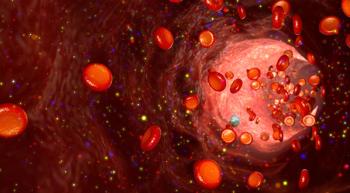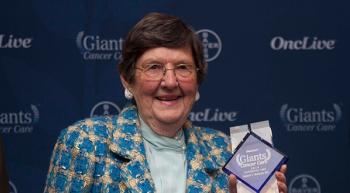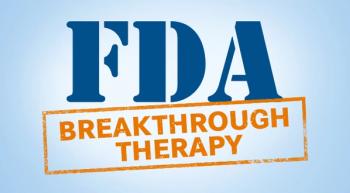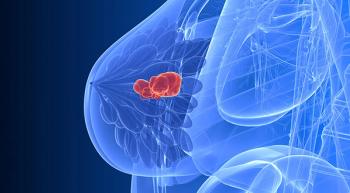
News


The oldest known cases of multiple myeloma and breast cancer have been discovered in two Egyptian mummies which were found in the pharaonic necropolis of Qubbet el-Hawa in Aswan, Egypt.

Impressive overall survival (OS) data from the phase III ENDEAVOR trial inspired the FDA to approve a supplemental new drug application to add it to the label for carfilzomib (Kyprolis) for use in patients with relapsed or refractory multiple myeloma.

Results of a large study showed that postmenopausal women who lost 5% or more of their body weight were 12% less likely to develop breast cancer than those whose weight remained stable; those who lost 15% or more reduced their risk by 37%.

A supplemental biologics license application for the CAR T-cell therapy tisagenlecleucel (Kymriah) has been granted a priority review by the FDA for use in adult patients with relapsed/refractory diffuse large B-cell lymphoma (DLBCL) who are ineligible for or relapse after autologous stem cell transplant.

Jimmie C. Holland, MD, known as the mother of psychosocial oncology, died last month at the age of 89. The oncology community has lost a pioneer in the integration of humanity into cancer care.

The FDA approved a new first-line treatment combination for patients with newly diagnosed low-risk acute promyelocytic leukemia (APL).

The Food and Drug Administration (FDA) estimates that the market for homeopathic drugs is about $3 billion. In an effort to crack down on the industry, the FDA announced a new, risk-based approach to regulating homeopathic treatments.

Approval opens up treatment possibilities for lung cancer patients with rare genetic mutations.

Cisplatin, a platinum-based chemotherapy agent that is used to treat testicular cancer, non-small cell lung cancer, bladder cancer, cervical cancer, ovarian cancer and head and neck cancer, has been found to cause a significant amount of hearing loss in patients, according to a recent article published in Nature Communications.

Based on results from the phase III OlympiAD trial, the FDA approved olaparib (Lynparza), a PARP inhibitor, for the treatment of patients with germline BRCA-positive, HER2-negative metastatic breast cancer who have previously received chemotherapy. HR-positive patients must also have had prior endocrine therapy.

Blueberries are known as a "superfood" because of the rich essential vitamins and minerals they provide. Research now shows they may also help to treat cancer.

Only a quarter of patients who have brain cancer enroll in hospice care with enough time to benefit from the comfort, symptom management and emotional support it can provide, a new study shows.

Patients diagnosed with thyroid cancer before the age of 40 appear to be at the highest risk for age-related diseases, including heart disease and diabetes, compared with their age-matched counterparts.

Though women presenting with breast pain are often sent by their clinicians for different types of breast cancer testing — typically undergoing mammography, an ultrasound, and a physical exam — a new study reveals that breast pain is not necessarily an indicator of cancer.

The FDA has granted a breakthrough therapy designation to the combination of pembrolizumab (Keytruda), a PD-1 inhibitor, and lenvatinib (Lenvima), a VEGF/FGF inhibitor, for the treatment of patients with advanced and/or metastatic renal cell carcinoma (RCC).

NextSource Pharma has raised the price of oral chemotherapy agent lomustine (Gleostine) by 1400% since acquiring the drug, which is used to treat Hodgkin lymphoma and glioblastoma, from Bristol-Myers Squibb in 2013.

Carfilzomib, commonly used to treat patients with multiple myeloma, may lead to an increased risk of cardiovascular events.

Denosumab (Xgeva), a RANK ligand inhibitor, has been approved by the FDA for the prevention of skeletal-related events (SREs) in patients with multiple myeloma.

The duo of lenalidomide (Revlimid) and rituximab (Rituxan) is a combination that is feasible, safe and active as initial and maintenance therapy for use in patients with mantle cell lymphoma, according to a new study.

Some younger women with breast cancer may soon have a new first-line treatment option. Ribociclib (Kisqali), has been granted a breakthrough therapy designation by the FDA for use in combination with tamoxifen or an aromatase inhibitor (AI) as frontline treatment for pre- or perimenopausal women with hormone receptor-positive, HER2-negative advanced or metastatic breast cancer.

Seattle Genetics announced that a supplemental biologics license application for brentuximab vedotin (Adcetris) used in combination with Adriamycin, vinblastine, and dacarbazine as a frontline treatment for advanced classical Hodgkin lymphoma has been granted a priority review by the FDA.

Progenics Pharmaceuticals announced that the FDA has granted a priority review designation to a novel version of the radiopharmaceutical iobenguane I-131 (Azedra), for patients with malignant or recurrent pheochromocytoma or paraganglioma.

A new study shows that using the targeted agents lapatinib (Tykerb) and trastuzumab (Herceptin) together, combined with an aromatase inhibitor (AI), significantly reduced the risk of death or progression in women with HER2-positive/HR-positive metastatic breast cancer compared with each single targeted agent in combination with an AI.

Researchers investigate the cellular biology of aging and the effects of cancer treatment associated with accelerated aging.

The combination of olaparib (Lynparza) and durvalumab (Imfinzi) for pretreated patients with germline BRCA-mutated (gBRCAm), HER2-negative metastatic breast cancer shows great promise for future treatment.

The FDA has granted priority review to a supplemental new drug application (sNDA) for use of dabrafenib (Tafinlar) and trametinib (Mekinist) in combination as an adjuvant treatment for patients with BRAFV600E– or V600K–positive stage III melanoma following complete resection.

Non-alcoholic fatty liver disease (NAFLD) is a risk factor for cancer, according to a recent report about a 7.5-year Korean study.

The FDA has approved a novel breast-specific stereotactic body radiotherapy (SBRT) device known as GammaPod as a treatment for patients with early breast cancer, based on findings from a 17-patient study.

The FDA has granted a priority review to a new drug application (NDA) for apalutamide (ARN-509) for the treatment of patients with nonmetastatic castration-resistant prostate cancer (CRPC). Apalutamide is an oral androgen receptor inhibitor.
